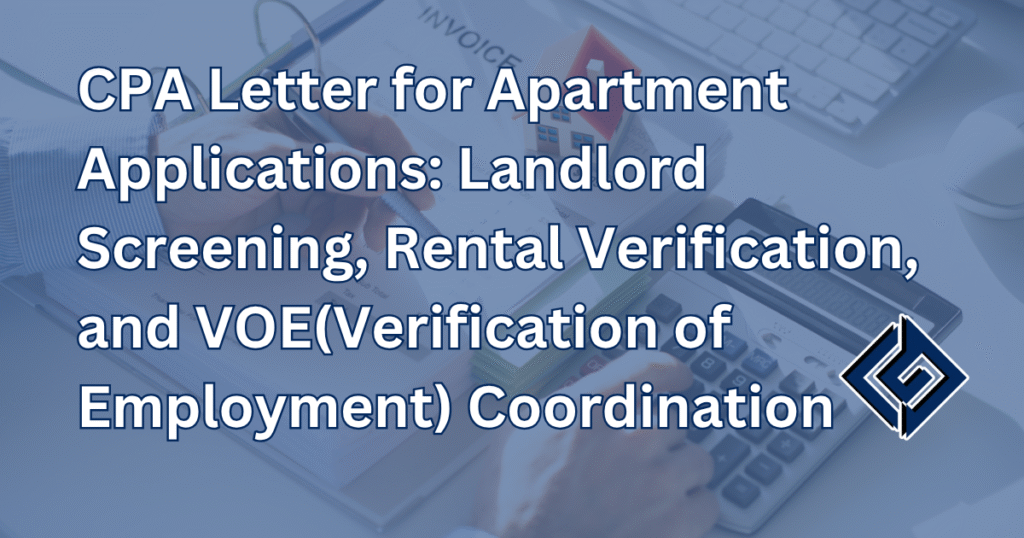Landlords want clear proof that you can pay rent on time. A cpa letter for apartment applications gives leasing teams a concise, professional statement they can read and file quickly. It confirms income, self-employment status if applicable, and how the numbers tie to records. If a building or state form requires it, we can issue a notarized cpa letter with an acknowledgment and seal.
What a CPA Letter for Apartment Screening Includes
A Certified Public Accountant prepares a short letter on firm letterhead.
It confirms income and provides brief context the property manager can trust.
Core elements
- Renter name and purpose (rental application).
- Period covered and income amount or range.
- Source records referenced: financial accounting reports (P&L, balance sheet), prior taxation filings, and bank activity.
- Scope limits and signature of a licensed CPA.
What it is not
- Not an assurance report under auditing standards.
- Not a prediction about future earnings.
- Not legal advice.
Why Landlords Ask for It (and How It Helps)
Leasing teams look for documentation that is accurate, consistent, and quick to verify.
- Clarity for screening. A CPA ties income to books or tax services work already filed.
- Consistency with VOE. If HR completes Verification of Employment, the CPA letter can complement that form for bonus/variable or self-employment context.
- Lower back-and-forth. Plain wording reduces follow-up emails and speeds a decision.
VOE(Verification of Employment) Coordination
Some properties use VOE to confirm salary for W-2 employees.
Your CPA can coordinate so numbers match.
When VOE alone isn’t enough
- Commission or bonus heavy roles.
- Side businesses or gig income.
- Recent promotions or equity distributions.
How we align the file
- Confirm the employer’s VOE totals.
- Add a one-paragraph note on variable pay or self-employment, as requested by the leasing office.
- Keep the CPA letter within professional limits, avoiding audits or opinions.
Notarized CPA Letter: When a Seal Is Required
Some buildings and state forms ask for notarization.
We prepare the CPA letter and coordinate the acknowledgment.
What “notarized” adds
- Identity check of the signer.
- Date, venue, notary seal, and certificate language.
- The accounting content does not change.
Common use cases
- Luxury or corporate housing packages.
- Relocation programs with strict onboarding checklists.
- State or municipal forms that explicitly say “notary acknowledgment required.”
Scope and Limits: Staying Within AICPA Guidance
CPAs follow the standards and ethics framework of the AICPA(American Institute of Certified Public Accountants) and state boards of public accountancy.
What CPAs can state
- Facts tied to records (filed tax forms, management financial statements, or bookkeeping ledgers).
- Simple comparisons or recalculations that leasing teams request.
What CPAs will not state
- Broad assurance like an audit or review conclusion.
- Future guarantees of income or employment.
- Statements outside accounting scope.
For practical interpretation of boundaries, many practitioners also consult the Journal of Accountancy and firm policies on third-party letters.
Who Can Sign: Licensure and Experience
Your letter should be signed by a licensed CPA in good standing.
- Licensure. Active CPA license under a state board; compliance with CPE and ethics rules.
- Experience. Work in public accounting, taxation, or financial accounting that supports the engagement.
- Firm representation. Letter issued on firm letterhead with contact details for verification.
Documents to Provide for a Smooth Turnaround
Short list. Clear files. Faster decision.
If you are W-2
- Most recent pay stubs.
- Last year’s tax forms (e.g., Form W-2; full return if requested).
- Employer contact for VOE.
If you are self-employed or a sole proprietor
- Year-to-date P&L and balance sheet.
- Two to three months of bank activity supporting deposits.
- Most recent filed return.
- Brief note on seasonality, if applicable.
CPA Letter for Apartment Sample
Subject: CPA Letter for Apartment Application — [Applicant Name]
I am a Certified Public Accountant for [Applicant/Company]. For the period [dates], I reviewed:
• Filed tax return(s) and/or current management financial statements, and select bank activity.
Based on these records, [Applicant] had income of $[amount] for [period]. Procedures were limited to comparisons and tie-outs. This is not an audit or assurance report.
Signed,
[Name], CPA — [Firm], License [State]
If the property requires a notarized cpa letter, a notary acknowledgment is added below the signature.
When Audits Are Mentioned in Leasing Emails
Leasing teams sometimes use the word “audit” casually.
For CPA letters, auditing standards do not apply unless you separately engage an audit or review.
- If a message says “audited financials,” confirm whether the building actually needs an audit report or will accept a CPA letter with supporting documentation.
- Most apartment screenings accept a letter plus documents rather than formal assurance.
Pricing, Timing, and Delivery
- Pricing. Flat fees for standard letters; notarization is an add-on when required.
- Timing. Short timelines once records are complete and the property’s template (if any) is provided.
- Delivery. PDF via secure link or direct to the leasing office; hard copy on request.
